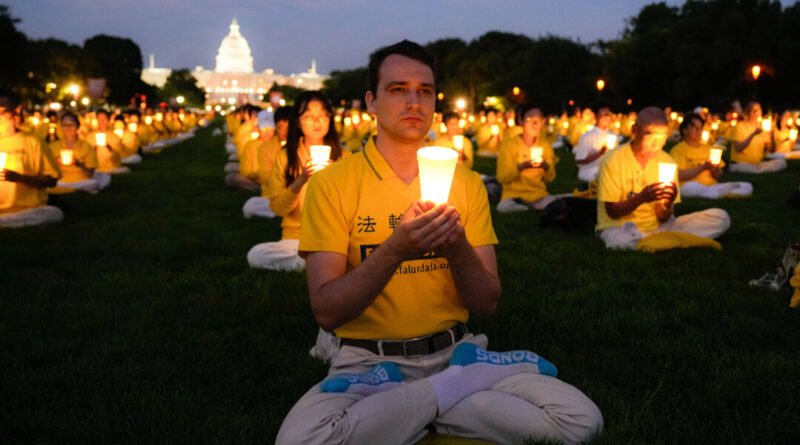CCP’s attempts to shape American perspectives through the repression of Falun Gong
Chinese influence operations aim to manipulate individuals’ perspectives to benefit the communist regime.
WASHINGTON—Researchers at an event marking the 25th year of Beijing’s campaign against Falun Gong revealed that the Chinese communist regime is influencing Western narratives to suppress Falun Gong beyond China’s borders.
Over the past 25 years, Western media have echoed the Chinese regime’s propaganda against Falun Gong. Editors and medical organizations have ignored evidence of the regime forcibly harvesting organs from political dissidents in China. Additionally, theaters in the West have refrained from showcasing performances shedding light on the regime’s human rights violations.
Panelists at the Hudson Institute event on July 17 highlighted these instances as a demonstration of the Chinese Communist Party’s (CCP) effective global influence campaign.
Nina Shea, the director of the Center for Religious Freedom at the Hudson Institute, described it as a “propaganda war,” warning that individuals who fall prey to these campaigns risk acting against the interests of the United States.
On July 18, the State Department stated that combating these operations globally is a top priority.
The State Department previously cautioned against such efforts. A September 2023 report noted that Beijing spends significant resources to create an international infrastructure to persuade foreign governments, elites, journalists, and society to accept the CCP’s preferred narratives unchecked. This can lead to biases that may influence nations’ decisions against their economic and security interests.
US as a ‘Core Battlefield’
The regime’s strategy in suppressing Falun Gong has largely succeeded over the years, Ms. Shea and other panelists at the Hudson Institute pointed out.
In 1999, the communist regime started systematically persecuting Falun Gong practitioners, a spiritual practice involving meditation and following principles of truthfulness, compassion, and tolerance. At the time of the persecution, there were an estimated 70 million to 100 million Falun Gong practitioners in China.
Aside from arbitrary detention, forced labor, and various forms of torture, Beijing launched a campaign through media outlets, school textbooks, and more to demonize Falun Gong and justify the persecution, both in China and abroad.
The CCP’s method in influence operations involves selecting controversial topics that resonate with Western audiences, generating negative news around them, and aiming to mainstream these narratives.
Levi Browde, the executive director at the Falun Dafa Information Center, provided an example of the Chinese consulate falsely claiming in 2009 that Falun Gong opposed interracial marriage.
Such misinformation found its way into a 2020 front-page article in The New York Times, showcasing how the CCP’s narratives penetrate Western society.
For years, Beijing has embedded these tactics in its directives to suppress Falun Gong activities overseas.
An internal government document from Henan Province in 2017 instructed lower-level officials to use partnerships between Chinese and Western cities to limit Falun Gong activities abroad effectively. The same document emphasized “cultivating nongovernmental sources” to combat Falun Gong by mobilizing influential individuals and experts in America and other nations to advocate for Beijing’s interests.
In a speech in 2015, Meng Jianzhu, the top official in China’s Central Political and Legal Affairs Commission, labeled the “struggle against Falun Gong” as a “political contest with anti-China forces in the West.” Mr. Meng referred to the United States as a “core battlefield” in this contest.
“We must seize the opportunity of Western countries’ rising demand for us and push the concerned countries to ban or restrict the activities of the ‘Falun Gong’ organization,” stated an excerpt from his confidential speech.
The CCP spreads propaganda and misinformation to dehumanize Falun Gong practitioners, portraying them as dangerous enemies of the state, according to Miles Yu, a China policy adviser during the Trump administration.
“This systemic vilification not only incites hatred and discrimination but also conceals the true nature of the [CCP’s] actions from the international community,” he stated.
Mr. Yu emphasized that the CCP’s actions violate international human rights standards.
Mr. Browde shared how he experienced the impact of the CCP’s hate campaign firsthand in the United States.
Once, he recounted entering a shop in Manhattan’s Chinatown wearing a Falun Gong T-shirt. The shop owner’s reaction exemplified the power of the CCP’s narrative in shaping perceptions.
Media Manipulation
Panelists highlighted that since most individuals don’t have direct experience with many global issues, they rely on the media for information. This reliance makes Western media a prime target for the CCP’s messaging.
Mr. Browde noted instances where media outlets unquestioningly amplified Beijing’s narratives without context, potentially changing public perceptions.
He described how this practice can reinforce the CCP’s control over information and opinions, influencing how people think and feel about various subjects.
In 2019, former New York Times reporter Didi Tatlow shared with the independent China Tribunal investigators that editors discouraged her from pursuing stories on Beijing’s forced organ harvesting of Falun Gong practitioners. This obstruction highlights how the CCP’s influence can shape editorial decisions and limit coverage of critical issues.
The repercussions of media outlets stifling coverage that contradicts the CCP’s narratives can be damaging and contribute to misinformation campaigns, according to Mr. Browde.
As the CCP continues to use influence and coercion to suppress criticism, collaboration persists between Chinese and Western medical companies, aiding an industry built on forced organ harvesting in China. Most individuals inadvertently support this crime due to misinformation or lack of awareness, allowing the CCP to shape their perceptions and decisions.
Mr. Browde stressed that the CCP’s tactics extend to artistic expression, such as efforts to shut down performances by Shen Yun Performing Arts, a cultural group that portrays traditional Chinese heritage and the persecution of Falun Gong in modern-day China.
Chinese officials use various methods to pressure venues and dignitaries to cancel Shen Yun performances, defaming Falun Gong in the process. By labeling Falun Gong as a “cult,” the CCP aims to influence public opinion and deter Americans from supporting the group.
Mr. Browde warned that the CCP’s strategies can be weaponized against any entity or nation, emphasizing the importance of vigilance against these threats as much as conventional warfare. The CCP aims to control the United States without resorting to direct confrontation.
“That’s really their end game,” Mr. Browde concluded.



